President Herbert Hoover signed the Smoot-Hawley Tariff Act on June 17, 1930. Over 1,000 economists had warned against this legislation. The act raised tariffs on thousands of imported goods to protect American industries.
The Smoot-Hawley Tariff Decision
Congressional Republicans pushed for higher tariffs during the economic downturn. Senator Reed Smoot and Representative Willis Hawley sponsored the comprehensive tariff bill. The legislation increased duties on over 20,000 imported items by an average of 40-48%. 📊 Agricultural products faced some of the steepest increases. Hoover initially hesitated but ultimately supported the protectionist measure.
Economic Theory Behind the Act
Supporters believed higher tariffs would protect American jobs and industries. They argued foreign competition was hurting domestic manufacturers and farmers. The theory suggested blocking cheaper imports would boost American production. ⚠️ However, most economists warned this approach would backfire spectacularly. They predicted international retaliation and reduced global commerce.
International Response to Tariffs
Foreign nations immediately imposed retaliatory tariffs on American exports. Canada, Britain, France, and other trading partners raised their own duties. 💰 American agricultural exports plummeted as overseas markets closed. The tariff war spread globally, crushing international trade volumes by over 25% within three years.
Impact:
The Smoot-Hawley Tariff Act created devastating economic consequences worldwide. International trade collapsed as nations engaged in destructive tariff warfare. American exports fell dramatically, deepening the Great Depression.
Immediate Trade War Consequences
Foreign governments retaliated swiftly against American tariff increases. Canada imposed duties on 16 American products within months. European nations restricted American agricultural imports significantly. 📉 U.S. exports dropped from $5.2 billion to $1.7 billion between 1929-1933. The tariff spiral accelerated global economic decline.
Devastating Impact on American Agriculture
Farmers suffered disproportionately from international retaliation. Agricultural exports plummeted as foreign markets closed to American products. Wheat, cotton, and corn prices collapsed under reduced demand. 🔥 Farm foreclosures increased dramatically across the Midwest. Rural banks failed at unprecedented rates, deepening agricultural crisis.
Global Economic Disruption
The act contributed significantly to worldwide economic contraction. International commerce shrank by over 25% between 1930-1933. European recovery efforts stalled due to reduced American trade. 🌍 Developing nations lost crucial export revenues from American markets. The tariff war prolonged and deepened the global depression, affecting millions worldwide.
Long-term Trade Policy Legacy
The Smoot-Hawley disaster influenced post-war trade policy permanently. Future leaders embraced multilateral trade agreements over protectionism. The act became a cautionary tale about tariff wars. Modern economists cite it as proof that trade restrictions harm global prosperity.
